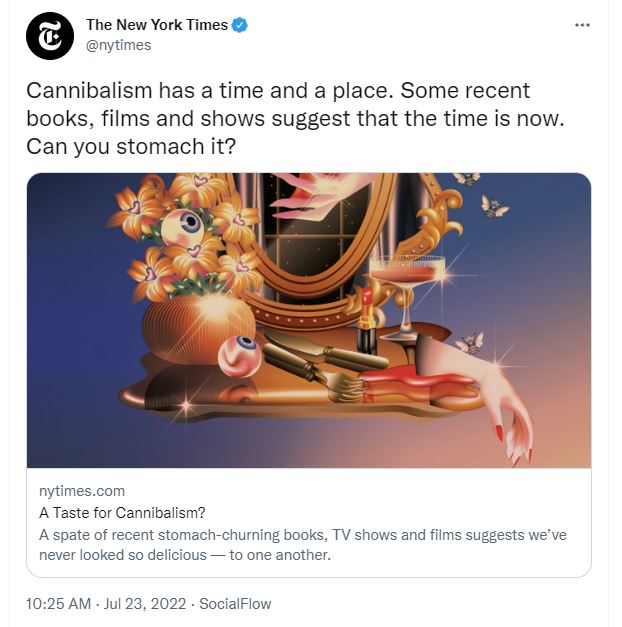In their latest demonic fetish, The New York Times pushed cannibalism in a piece published Saturday morning.
Yes, really.
Mainstream media has transitioned from promoting a buggy diet to eating human flesh.
And the Times suggests “The Time is Now” for cannibalism. They insist cannibalism has a time and place.
That figment of her twisted imagination is what prompted Ms. Summers to write her novel, “A Certain Hunger,” about a restaurant critic with a taste for (male) human flesh.
Turns out, cannibalism has a time and a place. In the pages of some recent stomach-churning books, and on television and film screens, Ms. Summers and others suggest that that time is now.
Sign of The (NY) Times: this institution is not only out of touch with reality, but humanity. I’d distance myself as far as possible from this vile institution if I were a journalist with any ounce of integrity. pic.twitter.com/SQSqJ5WAcG
— Te𝕏asLindsay™ (@TexasLindsay_) July 23, 2022

Here are a few excellent questions for the Times.
Is it more racist to eat white people, or black people?
Do different ethnicities taste different?
Is cannibalism indigenous science, and unfairly demonized by white supremacy patriarchy systems of oppression?
-We need answers to these super relevant questions https://t.co/9eF3V6BT91
— Alexander Cortes, Broscience, Fitness, Fat Loss (@AJA_Cortes) July 23, 2022
But as his book documents, cannibalism has occurred around the world throughout history, lending these fictional tales a queasy whiff of “what if?” the Times added.
The Times asked what’s fueling a desire for cannibalism stories:
As to what may be fueling the desire for cannibalism stories today, Ms. Lyle, the “Yellowjackets” co-creator, said, “I think that we’re obviously in a very strange moment.” She listed the pandemic, climate change, school shootings and years of political cacophony as possible factors.
“I feel like the unthinkable has become the thinkable,” Ms. Lyle said, “and cannibalism is very much squarely in that category of the unthinkable.”
According to Ms. Summers, cannibalism is always symbolic. For her novel’s protagonist, eating human flesh can be seen as a way of holding on to a relationship that ended. For Ms. Summers herself, the plot of “A Certain Hunger” can’t be uncoupled “from my own personal experiences with disordered eating, with the tamping down of feminine appetites, the way the media chews up and spits out writers, bougie consumption — and bougie lady consumption,” she said.
More generally, Ms. Summers thinks that the recent spate of cannibalistic plots could also be commentaries on capitalism. “Cannibalism is about consumption and it’s about burning up from the inside in order to exist,” she said. “Burnout is essentially over-consuming yourself, your own energy, your own will to survive, your sleep schedule, your eating schedule, your body.”
“Should it be the lab-grown human steak made from stem cells that spurred outrage at a London museum? The animal-free chicken, beef, salmon and dairy substitutes that some companies are creating using similar technology?” the Times stated.



Join the conversation!
Please share your thoughts about this article below. We value your opinions, and would love to see you add to the discussion!